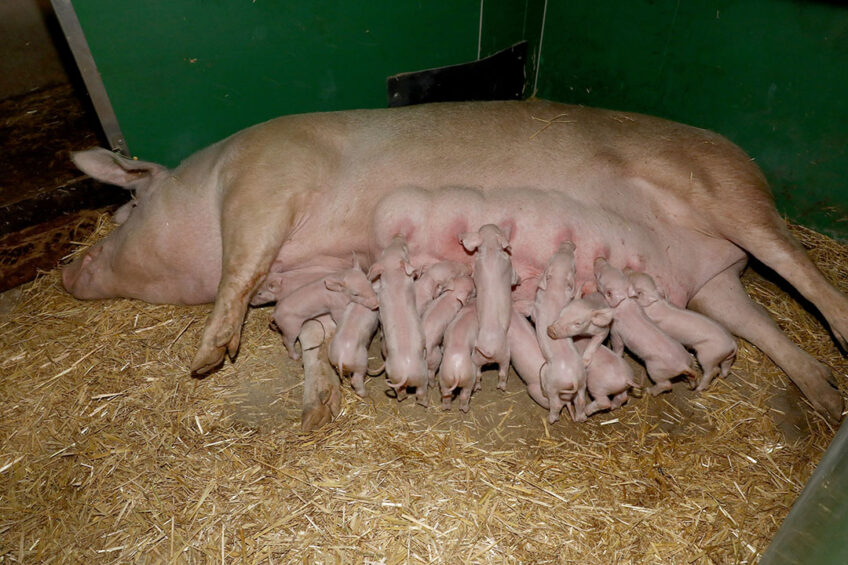Impact of initial gut microbiota colonisation on piglet performance

Research shows that the initial colonisation of gut microbiota in piglets occurs at least within the immediate prenatal period. Photo: Henk Riswick
Piglets encounter various events affecting the development of their gut microbiota. It is essential to identify when and how to establish and maintain the optimum piglet gut microbiota to have the best production outcomes.
What are gut microbiota?
Gut microbiota is a collection of bacteria, archaea, fungi, and viruses associated with an essential role in many body processes. Gut microbiota impact performance and manipulate improvements in feed efficiency and average daily gain. Early-life microbial colonisation is the most important time for shaping gut microbiota.
The sow’s microbiota and the rearing environment influence the piglet’s gut microbiota functionality and composition
Initial microbial colonisation
Research shows that the initial colonisation of gut microbiota in piglets occurs at least within the immediate prenatal period. The sow’s microbiota and the rearing environment influence the piglet’s gut microbiota functionality and composition. They also influence its immune system development, growth, and survival.
Piglet exposure to the sow vagina, its pen environment, and the sow’s antibiotic exposure, dietary treatments, the length of time between sow microbiota modulation and piglet exposure cause some differences between the sow’s microbiota and that of her her progeny.
Oxidative stress affects sow gut microbiota
During late gestation and early lactation, the sows’ metabolic demands increase. This leads to oxidative stress, which impairs energy balance, body condition, and milk production. It also causes negative outcomes for sows and piglets.
In addition, it affects their offspring’s gut microbiota. For instance, the abundance of Bacteroidaceae is associated with higher antioxidant capacity and better litter performance, while the presence of Phascolarctobacterium, Cyanobacteria and Streptococcus are linked with lower piglet performance and higher oxidative stress in sows.
Furthermore, the abundance of Lachnospiraceae, Marvinbryantia and Ruminococcaceae is higher in sows with an increased stillbirth rate and reduced antioxidant capacity. There also is an increase in the abundance of short-chain fatty acid producing and fiber-degrading bacteria such as Ruminococcus, Fibrobacter and Butyricicoccus, and higher concentrations of acetate, propionate, and n-butyrate, in the feces of higher performing sows.
Optimal gut microbiota in sows expose piglets to beneficial bacteria and establish, in them, optimal microbiota
Factors affecting gut microbiota development
Colostrum provides energy, immunity, and diverse bacteria and prebiotic compounds for gut development in neonates. In addition, optimal gut microbiota in sows expose piglets to beneficial bacteria and establish, in them, optimal microbiota. During the peripartum period, a sow’s gut microbiota composition, richness, and diversity alters. Potentially pathogenic bacteria such as Proteobacteria and Fusobacteria increase, whereas potentially beneficial butyrate producing bacteria such as Ruminococcus and Lachnospiraceae decrease. Gut permeability and the plasma endotoxin concentration improve.
Early microbial exposure
Piglet exposure to sow feed in lactation and environmental exposure influence the development of gut microbiota. Early microbial exposure has an integral role in gut microbiota development for piglets. Furthermore, maternal feces affects piglet microbial colonisation and improves piglet growth and survival. Moreover, cross-fostering alters piglet gut and cecal microbiota and improves growth performance.
Antibiotic administration
Early antibiotic administration for pathogen removal is non-selective and affects the commensal microbiota, reduces gut microbial diversity, increases antibiotic resistant bacteria, and leads to enteric dysbiosis. Maternal antibiotic administration has a negative effect on piglet gut morphology, with decreased crypt depth and altered gene expression profiles in the ileum.
Direct antibiotic administration decreases immunological communication. It also increases the expression of chemokine, and toll-like receptors. It decreases the abundance of potentially pathogenic bacteria such as Campylobacter and Pasteurella, and the abundance of potentially beneficial bacteria such as Prevotella and Butyrimonas.
Impact on production
Dietary additives such probiotics, prebiotics, and minerals are used to modulate the piglets’ gut microbiota. They also increase colonisation of beneficial bacteria, and improve health and the production outcome. Bacteria involved in higher performance include Lactobacillus, unclassified Prevotellaceae, and Ruminococcaceae.
Research shows that an increase in Ruminococcaceae in piglets is linked to improved growth during lactation. An increase in the abundances of Prevotella is associated with lower growth rates during lactation but a higher average daily gain after weaning. The increased abundance of Actinobacteria before weaning is a marker for increased post-weaning diarrhea, while increased abundance of Chlamydia and Helicobacter before weaning are markers for healthy and diarrhea-resistant pigs after weaning. A higher abundance of butyrate producing Christensenellaceae is linked with improved growth and reduced E. coli shedding.
Continuous microbial exposure
Gut microbial colonisation in early life is a major determinant of health and production performance. The establishment and development of the gut microbiota in piglets require continuous microbial exposure in neonates. However, the type and form of exposure that is not detrimental to the piglet in the post-weaning period must be considered.



